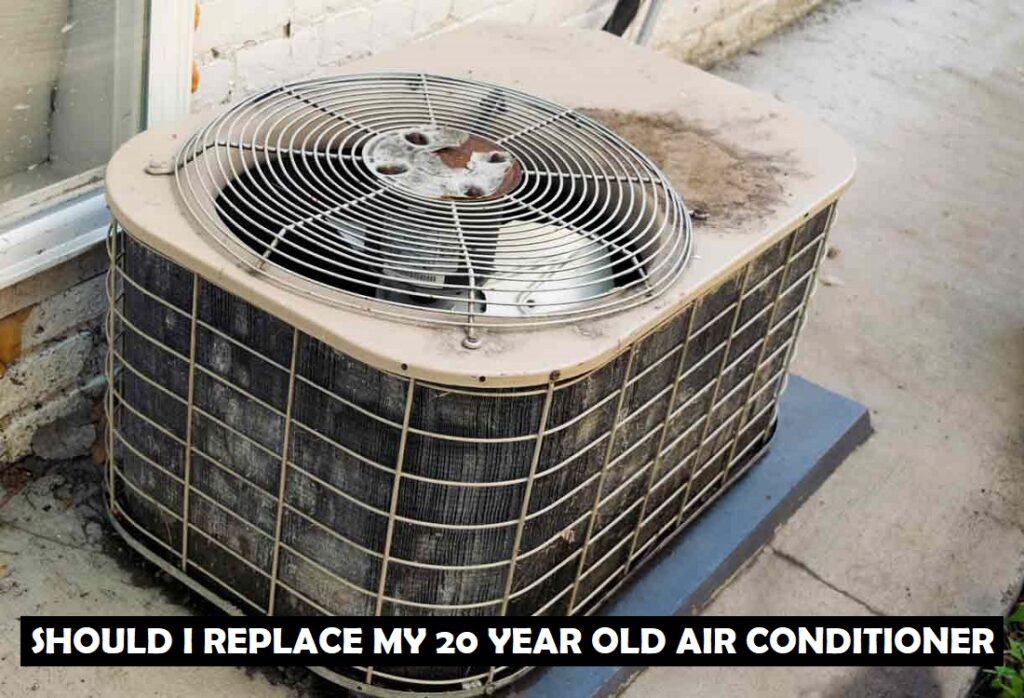Is your air conditioner showing signs of wear and tear after two decades of loyal service? It’s a question that many homeowners face at some point. With advancements in cooling technology and increasing energy efficiency, replacing an old air conditioner becomes a tempting option. In this article, we’ll explore the factors to consider when contemplating this decision and guide you toward making an informed choice.

Signs of an Aging Air Conditioner
As air conditioners age, they become less efficient in cooling your home. You might notice reduced airflow, inconsistent temperatures, and longer cooling cycles. Frequent breakdowns and the need for repairs become a common occurrence. Additionally, your energy bills might be climbing steadily due to the AC’s diminishing performance.
The Advantages of Upgrading
Upgrading your aging air conditioner brings several advantages. Newer models are designed to be more energy-efficient, which can lead to substantial cost savings in the long run. They also provide improved cooling performance, ensuring a more comfortable living space. Moreover, modern air conditioners come equipped with advanced features and technology, offering greater convenience and control.
The Cost Consideration
While the initial cost of purchasing a new air conditioner might seem substantial, it is essential to look at the bigger picture. Upgrading to a more energy-efficient model can significantly reduce your monthly energy bills over time, offsetting the investment. Additionally, various financing options are available to make the upfront cost more manageable.
Environmental Impact
Older air conditioners tend to consume more energy, resulting in higher greenhouse gas emissions. By replacing your old AC with an energy-efficient model, you contribute to reducing your carbon footprint. Alternatively, you may also explore eco-friendly alternatives like geothermal or solar-powered cooling systems.
Factors to Consider Before Replacement
Before making a decision, consider the age and overall condition of your current air conditioner. Assess the frequency and cost of repairs over the past few years. Also, evaluate your AC’s energy consumption, as this can help determine potential savings with a newer model.
Consulting a Professional
Seek advice from a qualified HVAC technician. They can conduct a thorough evaluation of your existing air conditioner and provide personalized recommendations based on your home’s size, cooling needs, and budget.
DIY Maintenance for Prolonged Lifespan
If you decide to keep your current AC for a bit longer, regular maintenance is crucial. Simple tasks like cleaning the unit and regularly replacing filters can extend the lifespan of your air conditioner and improve its performance.
Sustainable Practices for Old Units
If replacement is inevitable, consider eco-friendly ways to dispose of your old AC. Look for organizations that accept donations or recycling centers that handle old appliances responsibly.
The Process of Replacing an Air Conditioner
When replacing your air conditioner, choose a model that fits your home’s cooling requirements. Seek the help of a professional to ensure proper installation and optimal performance.
Common Misconceptions About Replacement
Some homeowners believe that repairing their old AC is a better option than replacing it entirely. However, with the advancements in energy-efficient technology, replacing an aging unit might be the more cost-effective choice in the long run.
Comparing Different Types of Air Conditioners
Explore different types of air conditioners available, such as central ACs, ductless mini-split systems, window units, and portable ACs. Each option has its advantages, so choose one that aligns with your specific needs.
The Importance of Regular Maintenance
After investing in a new air conditioner, regular maintenance is key to ensuring its longevity and peak performance. Schedule professional tune-ups and follow simple DIY maintenance tips to keep your AC running smoothly.
Extended Warranties and Protection Plans
Consider purchasing extended warranties or protection plans for your new air conditioner. These plans can provide added peace of mind and financial protection against unexpected repairs.
In conclusion, replacing your 20-year-old air conditioner can bring numerous benefits. Enhanced energy efficiency, improved cooling performance, and modern features make upgrading an appealing choice. However, if your current AC is still functioning well, proper maintenance can prolong its lifespan. Consulting a professional and understanding your specific needs are essential in making the right decision for your home and comfort.

